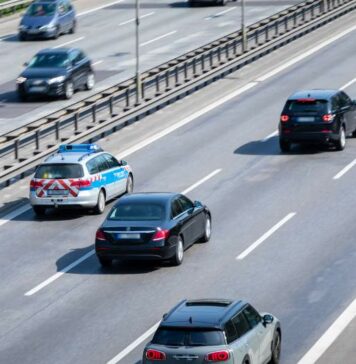German license holders can drive in the UK using their valid German driving license. However, there are certain rules and requirements to be aware of in order to ensure a smooth experience.
We will discuss the validity of a German driving license in the UK, the process of converting it to a UK license if necessary, and some tips for safe driving in the UK. Let’s learn more about driving in the UK with a German license.
Driving in the UK with a German License
Holders of a valid German driving license can drive in the UK without the need for an International Driving Permit (IDP), as the UK recognizes German driving licenses. If you are a tourist or a short-term visitor, your German driving license remains valid for the duration of your stay in the UK.
However, if you intend to become a resident of the UK, you may need to exchange your German driving license for a UK one. German driving license holders who are residents of the UK can continue using their valid German license until it expires, or until they turn 70 years old, whichever comes first.
After becoming a UK resident, it is recommended to exchange your German license for a UK one within three years of residency.
Converting a German Driving License to a UK License
If you decide to exchange your German driving license for a UK one, you must follow the conversion process outlined below:
- Check the eligibility: Make sure you meet the necessary requirements for exchanging your license. You must be a UK resident, have a valid German driving license, and meet the minimum age and eyesight requirements for the relevant vehicle category.
- Fill out the application form: Download and complete the D1 application form, which is available from the DVLA website or at your local Post Office. The form contains detailed instructions on how to fill it out correctly.
- Gather the required documents: Along with the completed D1 form, you will need to submit the following documents:
- Your German driving license (original)
- A passport-style color photograph
- Proof of identity (such as a valid passport)
- Proof of UK residency (e.g., a utility bill or bank statement dated within the last three months)
- Pay the application fee: There is a fee for exchanging your driving license, which can be paid by cheque or postal order made payable to ‘DVLA, Swansea.’ There is a £43 fee to convert your driving licence in the UK.
- Send the application: Send the completed D1 form, required documents, and payment to the DVLA address provided on the form. Ensure you use a secure postal service, as you will be sending your original German driving license and other valuable documents.
Brexit’s Impact on Deutscher Führerschein in England
Driving in the UK with a German license after Brexit. The United Kingdom’s withdrawal from the European Union has brought about several changes to the process and requirements for German driving license holders in the UK.

This section will explore the implications of Brexit on the Deutscher Führerschein in England and how it has affected the mutual recognition of driving licenses between the two countries.
- Impact on Validity of German Driving Licenses in the UK: German nationals who are UK residents can still drive in the UK using their valid German driving licenses, provided that the license remains valid in Germany and that they meet the minimum age and eyesight requirements for the vehicle category. However, after becoming a UK resident, German license holders are encouraged to exchange their licenses for UK ones within three years of residency, as the automatic recognition of German driving licenses in the UK is subject to change due to ongoing negotiations between the UK and EU.
- Additional Verification Procedures: Brexit has led to increased scrutiny of driving licenses issued in EU countries, including Germany. As a result, the DVLA may carry out additional verification procedures when processing applications to exchange German driving licenses for UK ones. This could potentially lead to longer processing times for applications.
- Impact on UK Nationals Living in Germany: The changes brought about by Brexit also affect UK nationals residing in Germany. They are now required to exchange their UK driving licenses for German ones within six months of becoming a German resident. This process may involve taking a German driving test, depending on individual circumstances and the specific requirements of the German licensing authorities.
Tips for Safe Driving in the UK
Driving in the UK can be a different experience for those accustomed to driving in Germany or other countries. Defensive driving is always a good idea. To ensure a safe and enjoyable experience, it is essential to be aware of the specific rules, regulations, and road conditions in the UK. Here are some tips for safe driving in the UK:
- Drive on the left: Unlike many countries, including Germany, the UK has traffic flowing on the left side. Remember this at roundabouts, turns, and intersections.
- Familiarize yourself with UK road signs: UK road signs can differ from Germany’s. Study the UK Highway Code to understand speed limits, directions, and warnings.
- Understand speed limits: UK speed limits are in mph, not km/h. Typically, it’s 30 mph in towns, 60 mph on single-carriageways, and 70 mph on dual-carriageways and motorways.
- Use roundabouts correctly: In the UK, roundabouts manage traffic at intersections. Yield to the right and know the proper lane and signals for entering and exiting.
- Adapt to different road conditions: From narrow lanes to busy motorways, be ready to adjust your driving in the UK.
- Drive defensively: Practice defensive driving in the UK by being aware, anticipating hazards, and keeping a safe distance.
- Be aware of local weather conditions: UK weather can change quickly. Drive cautiously in the rain, fog, ice, or snow.
- Keep your vehicle well-maintained: Check tires, brakes, and lights, and have spare tools. Maintenance is key for safety.
- Know your route: Plan your journey and know your route, using navigation or a map, but also follow road signs.
- Follow the Highway Code: The UK Highway Code outlines driving rules. Know and follow it for safety.
By following these tips and staying informed about the specific rules and regulations for driving in the UK with a German license. By the way, you can drive in Germany with a British driving license.






